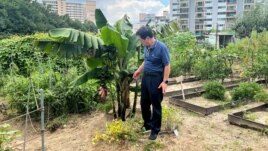11 August, 2024
Ma Myung-sun had low expectations for the subtropical bananas he planted in a community farm in Seoul. He must use a greenhouse for part of the year to protect them from South Korea's cold winters.
But warmer temperatures due to climate change have produced a welcome surprise in the form of flowers and fruit.
The land area where subtropical crops are grown in South Korea has increased from about 295 hectares in 2021 to 3,306 hectares in 2023.

South Korean farmer, Ma Myung-sun, stands next to a banana tree at his community farm in Seoul, South Korea, July 31, 2024. (REUTERS/Minwoo Park)
South Korea's state agricultural organization, the Rural Development Administration, reports that there are 67 banana farms in the south. And Ma is among a growing number of farmers experimenting with crops usually grown in a warmer climate.
"I want to try growing other tropical crops too. So, as you can see here, I have planted these papaya trees as well,” Ma said, pointing to a small papaya plant.
Ma opened up part of his family's farm to people from the city in 2006. He is happy about his small success. But he worries about what it means for the climate.
"I feel that the climate crisis has become very serious," said Ma, who has been a farmer for 25 years.
South Korea lies in the temperate zone and has four seasons. But its climate appears to be getting warmer and wetter throughout the year.
The Korea Meteorological Administration reports that since 2012, the average yearly temperature has been continually rising. The average temperature last year of 13.7 degrees Celsius was the highest since its records began in 1973.
Plenty of rain
Rainfall during last year's rainy season was 660.2 mm nationwide, nearly two times the 356.7 mm annual average figure.
Kim Kwang-soo is a professor of Agriculture and Life Sciences at Seoul National University. Kim said South Korea's climate conditions were becoming more like subtropical areas, so it is important for farmers to find the right crop varieties for the climate.
Tropical and subtropical fruit are usually expensive in South Korea, so shoppers should welcome the less costly local produce.
"My kids love bananas. So, it would be good if we harvest bananas in this country," said Kim Ji-youn, who was purchasing imported bananas in a Seoul supermarket.
I'm Jill Robbins.
Minwoo Park and Dogyun Kim reported this story for Reuters. Jill Robbins adapted it for Learning English.
______________________________________________
Words in This Story
greenhouse – n. a building or part of a building that has glass walls and a glass roof and that is used for growing plants
subtropical – adj. relating to or living in an area that is close to tropical parts of the world
temperate – adj. having temperatures that are not too hot or too cold
expensive – adj. costing a lot of money